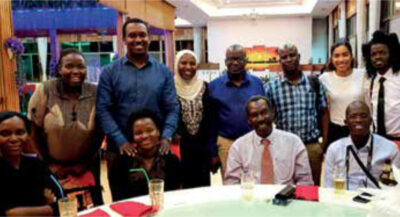Main content
In 2018 approximately 570,000 women were diagnosed with cervical cancer worldwide, and 311,000 died of the disease, of whom 90% were living in low- and middle-income countries (LMICs).[1] Global projections show that the incidence of cervical cancer will further increase with a continuous unequal burden in LMICs. It was also in 2018 that the World Health Organization (WHO) launched its call for action to eliminate cervical cancer, an important step in the continuing fight against this deadly and preventable disease. As a result, many governments of LMICs and high-income countries (HICs) are being urged to take action. The WHO has set targets to achieve a global coverage of 90% for human papillomavirus (HPV) vaccination, 70% for screening, and 90% for treatment by 2030.[3] Consequently, there is a need for more trained professionals with expertise in gynaecologic oncology.
Before the effect of HPV vaccination will become evident, increased cervical screening will result in growing numbers of patients diagnosed with precancerous cervical lesions and early-stage invasive carcinoma in need of adequate treatment. The expected increase, however, will not solely apply to cervical cancer. As a result of the demographic changes in population in LMICs, non-communicable diseases are increasing and are expected to rise even more in the near future. While there is a known severe shortage of health care workers in general in LMICs, this seems to be more acute for physicians specifically trained in surgical oncology, leaving many parts of the world underserved in the (surgical) care of patients, including women with gynaecologic malignancies.[4-6] The scarcity of oncologic care in LMICs leads to a high mortality and burden of disease.[4] In this paper we introduce you to a mentoring programme in the field of gynaecologic oncology in Uganda, illustrating the needs, opportunities and challenges of an international partnership addressing these needs.
The IGCS mentorship programme in Uganda
In 2017, the International Gynaecologic Cancer Society (IGCS) launched the IGCS Gynaecologic Oncology Global Curriculum & Mentorship Programme to address this shortage of trained health care workers specialised in gynaecologic oncology, by training local gynaecologists carefully selected by a board of clinicians.[7] This two-year programme is a capacity building initiative to equip health workers with a basic toolkit adapted to their particular context. In total, twelve training sites in twelve different countries were identified, including Uganda.
The programme started in 2017 at the Uganda Cancer Institute (UCI) in Kampala, the capital city. UCI is the tertiary referral hospital for oncology in Uganda and trains fellows with interest in gynaecologic oncology. The selection process for the trainees is run by UCI and includes a panel of local mentors, public health experts and administrative staff.
The Ugandan programme involves five elements:
- Twinning: international mentors from UCSF (University of California San Francisco), Duke University, Leipzig University and Leiden University partner with local mentors and fellows. The external mentors are registered at the Ugandan national medical council.
- Virtual education: the fellows follow a web-based curriculum and participate in monthly video conferences with their international mentors and monthly virtual tumour-boards.
- Hands-on training: the international mentors travel to Uganda two to three times a year for hands-on open surgical training (including LEEP and cervical conisation). Patients usually have been selected for surgery prior to the arrival of the international mentor. When possible, two operation rooms run simultaneously to enable mostly open surgery on all selected patients and to maximise teaching opportunities. During their visits, international mentors are also involved in teaching, live tumour-board meetings, and research. Fellows have the opportunity to travel to the institution of the international mentors for one to three months during their fellowship. Fellows participate in tumour-boards and journal clubs at the host site and observe complex surgery. Since registration for fellows as medical doctor in the host countries can be very time consuming and time is relatively short, this observation can be considered a good alternative to hands-on training. Often Ugandan (Sub-Saharan) medical professionals face exceptional hurdles when registering in host countries. It is a protracted and expensive process, since a number of literacy and professional exams are mandatory and costly.
- Portfolio: both international and local mentors evaluate the fellow’s progress with local mentor evaluation reports, surgical case log review, and interim knowledge assessments.
- Examination: upon completion of the programme, each fellow will take a final examination (combination of written and oral) and, if successful, will receive a certificate of satisfactory completion of training.

Since the programme’s inception in 2017, two fellows have successfully completed the training in Uganda and are now involved in the gynaecologic oncology faculty activities. Three other fellows are scheduled to take the final exam this year.
In Uganda, the costs for the fellowship have been subsidised by a grant provided by the African Development Bank for a period of five years. It covers salaries of the fellows for the duration of two years. At the same time the UCI is trying to convince the Ministry of Health to recruit and formally retain the new gynaecologic oncologists.
Challenges of the programme
The contextualisation of specialised care poses a conflict for physicians regarding knowing the optimal management for the patient or providing what is available. Besides providing higher quality of care for a subgroup of patients, it will also lead to complex ethical dilemmas.
The infrastructure required to practice their subspecialisation is lacking.[8] For example, many hospitals are not equipped with fully functional high dependency units or intensive care units, or if present these are understaffed, especially the nursing teams. Therefore, postoperative care for complex surgical cases such as ovarian cancer surgery and radical hysterectomies is compromised. Specialised care will be centralised in the capital city, limiting treatment possibilities for patients in more rural areas.
Besides the inadequate medical infrastructure, there is a lack of budget for medical specialists with a subspecialisation. Many health care professionals will be interested to specialise further and there is a clear need in the area of gynaecological oncology. Subspecialists are however not yet recognised as an official category (with its attendant salary, emoluments or benefits), and therefore potential subspecialists could question why they should undertake such an intensive training if it will not be recognised upon completion.
In Uganda, this problem is reflected by the first fellows who graduated from the programme in 2019. So far, none of them have been able to find a position in the formal civil service of Uganda with an emphasis on gynaecological oncology. This is partly due to the novelty of the subspecialisation with no formal vacancies available and budgetary constraints. Currently fellows are working at UCI and the Mulago Woman’s Referral Hospital in gynaecological oncology clinics under a small grant, expected to last a few years. Because of these limitations, the fellows can only utilise some of their acquired skills. Involvement of the Ministry of Health is needed for a sustainable solution. This will make gynaecological cancer care accessible for women in the country and will ultimately reduce the burden of gynaecological cancers in Uganda.
The ongoing Covid-19 pandemic and associated disruptions have spawned a melange of additional challenges for the programme. For the last nine months, no international mentor has been able to visit Uganda as a result of the lockdown. Mandatory Covid testing of all patients prior to surgery at the patient’s cost (circa US$ 65) further disrupted surgical practice. Patient numbers greatly decreased during the initial lockdown and only recently started picking up after the lockdown was halted.
Conclusion
Despite its challenges, the IGCS membership programme provides a unique opportunity to train motivated and experienced local gynaecologists in a contextualised set of skills and to provide gynaecological oncology care in settings with a high demand. As cancer cases are expected to increase in the near future, including gynaecological malignancies, the provision of cancer care will increasingly become of vital importance. To embed this care into the existing health care system, strong collaboration with the Ministry of Health is needed. The lessons learned from this membership programme will guide future training of subspecialists in low-resource settings.
References
- Arbyn M, Weiderpass E, Bruni L, et al. Estimates of incidence and mortality of cervical cancer in 2018: a worldwide analysis. Lancet Glob Health. 2020 Feb;8(2):e191-2203. doi: 10.1016/S2214-109X(19)30482-6
- Global Cancer Observatory [Internet]. Lyon: International Agency of Research on Cancer; 2021. Available from: https://gco.iarc.fr
- Brisson M, Kim JJ, Canfell K, et al. Impact of HPV vaccination and cervical screening on cervical cancer elimination: a comparative modelling analysis in 78 low-income and lower-middle-income countries. Lancet. 2020 Feb 22;395(10224):575-90. doi: 10.1016/S0140-6736(20)30068-4
- Global Burden of Disease Cancer Collaboration, et al. Global, regional, and national cancer incidence, mortality, years of life lost, years lived with disability, and disability-adjusted life years for 29 cancer groups, 1990 to 2017: a systematic analysis for the Global Burden of Disease Study. JAMA Oncol. 2019 Dec 1;5(12):1749-68. doi: 10.1001/jamaoncol.2019.2996
- Meara JG, Leather AJ, Hagander L, et al. Global Surgery 2030: evidence and solutions for achieving health, welfare, and economic development. Lancet. 2015 Aug 8;386(9993):569-624. doi: 10.1016/S0140-6736(15)60160-Χ.
- World Health Organization [Internet]. Geneva: World Health Organization; 2021. Bulletin of the World Health Organization; 2008 Aug. Available from: https://www.who.int/bulletin/volumes/86/8/07-050435/en/
- International Gynecologic Cancer Society [Internet]. Austin: International Gynecologic Cancer Society; 2019. Global Curriculum & Mentorship Program; 2019. Available from: https://igcs.org/mentorship-and-training/global-curriculum
- Linden AF, Sekidde FS, Galukande M, et al. Challenges of surgery in developing countries: a survey of surgical and anesthesia capacity in Uganda’s public hospitals. World J Surg. 2012 May;36(5):1056-65. doi: 10.1007/s00268-012-1482-7



















































